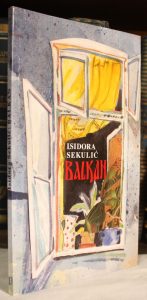Isidora Sekulić – unless you are from Serbia or former Yugoslavia you have very probably never heard that name before. And that is a pity because she was a very remarkable woman and writer.
Sekulić was born in 1877 in a small town in Northern Serbia, at a time when it was extremely rare and unusual for a woman to get a good education; but she was lucky: her father, a lawyer, thought obviously differently from most men of his time (not only in Serbia) and made it possible for his daughter to study.
Isidora graduated from the Teachers College in Sombor, then from the Higher Pedagogicum in Budapest and finally got her Ph.D. in Berlin; she was fluent in seven languages, traveled on her own, and had an excellent knowledge of European art and culture. Most of her life she lived in Belgrade working as a teacher and later in the lexicography department of the Serbian Academy of Sciences.
A small collection of her essays on the Balkans is to my knowledge so far the only part of her work that is translated at all. These essays have the titles: Balkans, The Balkans (notes of a Balkanophile), The Problem of the Small Nation, and Concentrating – Absentmindedness is not a fault but a vice. These essays are complemented in the edition I can recommend here by a short introductory essay The Policies of Friendship, by Nataša Marković and an instructive afterword Blood and Honey by Darko Tanasković and a short biographic sketch.
Sekulić’s main other works, although so far untranslated, give an impression regarding her intellectual interests as a writer: Fellow-Travelers, Letters from Norway, The Deacon of Notre Dame, The Chronicles of the Small-Town Cemetery, Analytical Moments and Topics, To My People, Speech and Language, a cultural review of the nation, and a biography of Njegoš, the Poet-King.
Sekulić was very modern in her writing. In her belletristic texts she used the stream-of-consciousness technique before Virginia Woolf. It is said that Sekulić was adequately Serb and adequately European and cosmopolitan at the same time. In her essayistic writing she would anticipate a concept that would be later called The Politics of Friendship by Jacques Derrida. In her words
“only culture connects people, states and nations; everything else separates them. Cultural contacts are the joy of people…”
Her essay The Problem of the Small Nation should be obligatory reading for each politician of a big nation that thinks he is entitled to decide or have a say in the fate of small nations.
“It is not easy being a small nation: not in Finland, not in Norway, not in Serbia…we are small and we are alone!”
And the following note seems to be written today, so fresh and still valid is it:
“Serbia as a small country must join the world, Europe, at any cost, but not at the cost of losing its dignity and its identity…”
At its core, the Balkan nations have survived the roughly five centuries of Ottoman rule and the five decades of Communism with their particular identity intact; now it is time to become a part of Europe not only economically – without losing its identity and without inferiority complex. Sekulić’s message is as actual as ever.
Sekulić, in many respects a predecessor of Maria Todorova and other scientists that deal with the Balkan identity, is a fascinating author that should be discovered finally also outside her home country – so let’s hope for more translations of her books and essays and maybe also one day a biography that will be available to readers outside Serbia. Her Politics of Friendship are now needed more than ever.

Isidora Sekulić: Balkan, translated by Vuk Tošić, bi-lingual edition Serbian-English, Plavi jahač, Belgrade 2013
Jacques Derrida: Politics of Friendship, trans. George Collins (London & New York: Verso, 1997)
Maria Todorova: Balkan Identities: Nation and Memory, Hurst, London & New York University Press, 2004
Maria Todorova: Imagining the Balkans, New York: Oxford University Press, 2009
© Thomas Hübner and mytwostotinki.com, 2014-5. Unauthorized use and/or duplication of this material without expressed and written permission from this blog’s author and/or owner is strictly prohibited. Excerpts and links may be used, provided that full and clear credit is given to Thomas Hübner and mytwostotinki.com with appropriate and specific direction to the original content.



 Facebook
Facebook RSS
RSS Twitter
Twitter